Law 294: Ministerial Responsibility, Brexit & Legal Advice Privilege
VerifiedAdded on 2023/04/21
|6
|2065
|201
Essay
AI Summary
This essay delves into the critical aspects of government openness, specifically focusing on ministerial responsibility in the context of Brexit and the contentious issue of whether legal advice related to Brexit should be subject to parliamentary privilege. It examines the constitutional convention of individual ministerial responsibility, highlighting that ministers are accountable for their actions and those of their departments. The essay contrasts this with the collective responsibility of the cabinet, where members must publicly support decisions or resign. It further explores the implications of this doctrine, citing examples where ministers were held accountable for departmental failures. The analysis extends to the legal debate surrounding the disclosure of Brexit legal advice, questioning the government's reliance on legal professional privilege and arguing for transparency in matters of significant national interest. The essay concludes by emphasizing the importance of balancing confidentiality with the public's right to know, particularly when elected representatives call for disclosure.
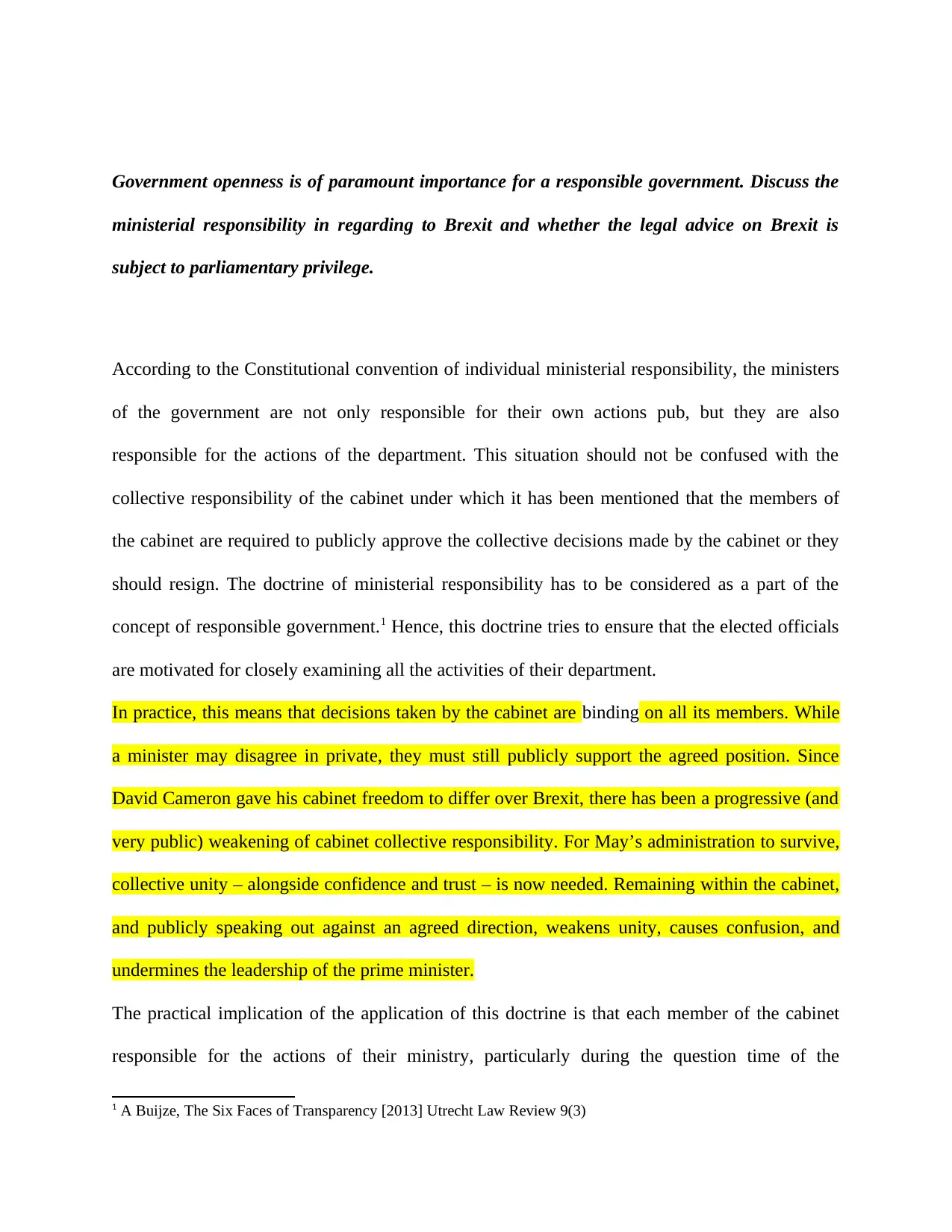
Government openness is of paramount importance for a responsible government. Discuss the
ministerial responsibility in regarding to Brexit and whether the legal advice on Brexit is
subject to parliamentary privilege.
According to the Constitutional convention of individual ministerial responsibility, the ministers
of the government are not only responsible for their own actions pub, but they are also
responsible for the actions of the department. This situation should not be confused with the
collective responsibility of the cabinet under which it has been mentioned that the members of
the cabinet are required to publicly approve the collective decisions made by the cabinet or they
should resign. The doctrine of ministerial responsibility has to be considered as a part of the
concept of responsible government.1 Hence, this doctrine tries to ensure that the elected officials
are motivated for closely examining all the activities of their department.
In practice, this means that decisions taken by the cabinet are binding on all its members. While
a minister may disagree in private, they must still publicly support the agreed position. Since
David Cameron gave his cabinet freedom to differ over Brexit, there has been a progressive (and
very public) weakening of cabinet collective responsibility. For May’s administration to survive,
collective unity – alongside confidence and trust – is now needed. Remaining within the cabinet,
and publicly speaking out against an agreed direction, weakens unity, causes confusion, and
undermines the leadership of the prime minister.
The practical implication of the application of this doctrine is that each member of the cabinet
responsible for the actions of their ministry, particularly during the question time of the
1 A Buijze, The Six Faces of Transparency [2013] Utrecht Law Review 9(3)
ministerial responsibility in regarding to Brexit and whether the legal advice on Brexit is
subject to parliamentary privilege.
According to the Constitutional convention of individual ministerial responsibility, the ministers
of the government are not only responsible for their own actions pub, but they are also
responsible for the actions of the department. This situation should not be confused with the
collective responsibility of the cabinet under which it has been mentioned that the members of
the cabinet are required to publicly approve the collective decisions made by the cabinet or they
should resign. The doctrine of ministerial responsibility has to be considered as a part of the
concept of responsible government.1 Hence, this doctrine tries to ensure that the elected officials
are motivated for closely examining all the activities of their department.
In practice, this means that decisions taken by the cabinet are binding on all its members. While
a minister may disagree in private, they must still publicly support the agreed position. Since
David Cameron gave his cabinet freedom to differ over Brexit, there has been a progressive (and
very public) weakening of cabinet collective responsibility. For May’s administration to survive,
collective unity – alongside confidence and trust – is now needed. Remaining within the cabinet,
and publicly speaking out against an agreed direction, weakens unity, causes confusion, and
undermines the leadership of the prime minister.
The practical implication of the application of this doctrine is that each member of the cabinet
responsible for the actions of their ministry, particularly during the question time of the
1 A Buijze, The Six Faces of Transparency [2013] Utrecht Law Review 9(3)
Paraphrase This Document
Need a fresh take? Get an instant paraphrase of this document with our AI Paraphraser
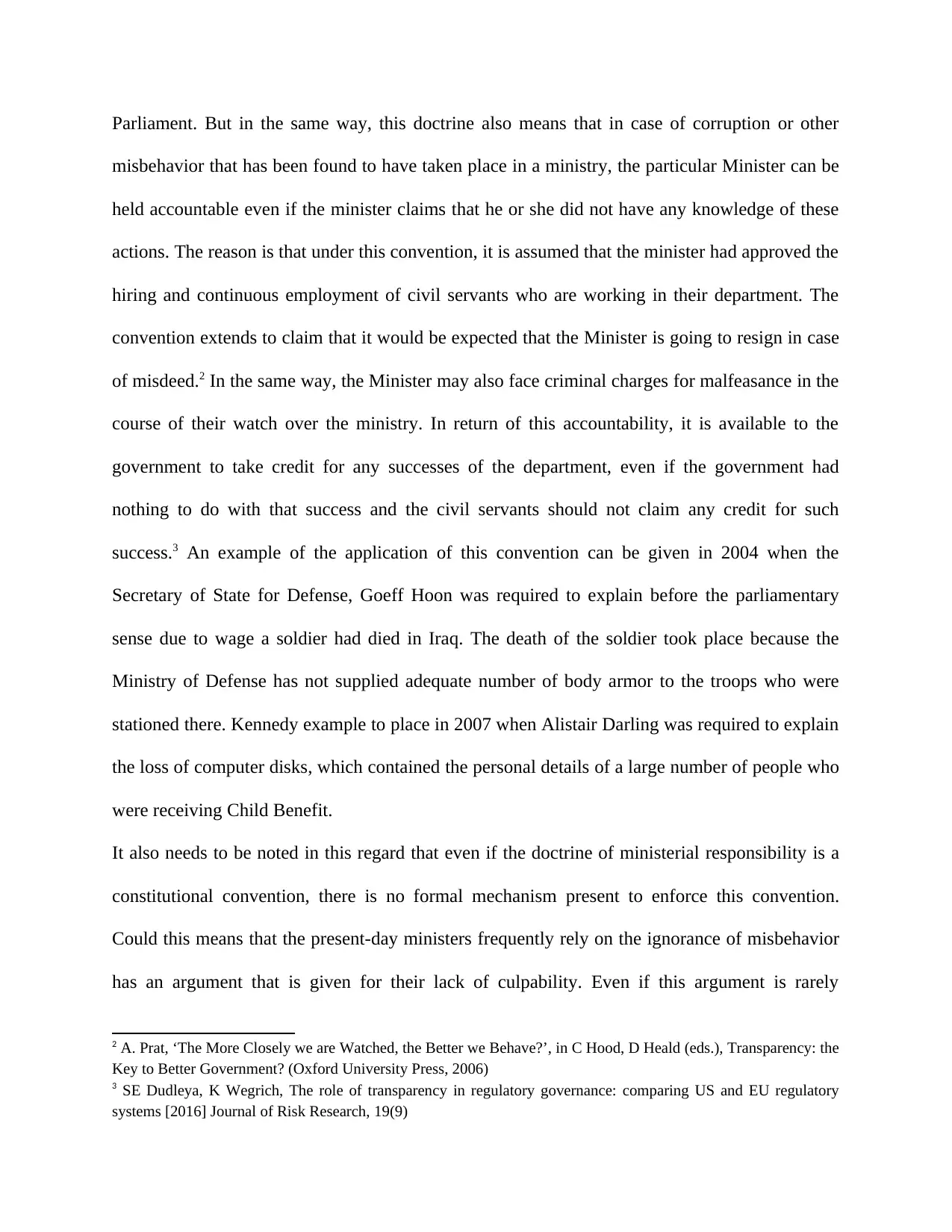
Parliament. But in the same way, this doctrine also means that in case of corruption or other
misbehavior that has been found to have taken place in a ministry, the particular Minister can be
held accountable even if the minister claims that he or she did not have any knowledge of these
actions. The reason is that under this convention, it is assumed that the minister had approved the
hiring and continuous employment of civil servants who are working in their department. The
convention extends to claim that it would be expected that the Minister is going to resign in case
of misdeed.2 In the same way, the Minister may also face criminal charges for malfeasance in the
course of their watch over the ministry. In return of this accountability, it is available to the
government to take credit for any successes of the department, even if the government had
nothing to do with that success and the civil servants should not claim any credit for such
success.3 An example of the application of this convention can be given in 2004 when the
Secretary of State for Defense, Goeff Hoon was required to explain before the parliamentary
sense due to wage a soldier had died in Iraq. The death of the soldier took place because the
Ministry of Defense has not supplied adequate number of body armor to the troops who were
stationed there. Kennedy example to place in 2007 when Alistair Darling was required to explain
the loss of computer disks, which contained the personal details of a large number of people who
were receiving Child Benefit.
It also needs to be noted in this regard that even if the doctrine of ministerial responsibility is a
constitutional convention, there is no formal mechanism present to enforce this convention.
Could this means that the present-day ministers frequently rely on the ignorance of misbehavior
has an argument that is given for their lack of culpability. Even if this argument is rarely
2 A. Prat, ‘The More Closely we are Watched, the Better we Behave?’, in C Hood, D Heald (eds.), Transparency: the
Key to Better Government? (Oxford University Press, 2006)
3 SE Dudleya, K Wegrich, The role of transparency in regulatory governance: comparing US and EU regulatory
systems [2016] Journal of Risk Research, 19(9)
misbehavior that has been found to have taken place in a ministry, the particular Minister can be
held accountable even if the minister claims that he or she did not have any knowledge of these
actions. The reason is that under this convention, it is assumed that the minister had approved the
hiring and continuous employment of civil servants who are working in their department. The
convention extends to claim that it would be expected that the Minister is going to resign in case
of misdeed.2 In the same way, the Minister may also face criminal charges for malfeasance in the
course of their watch over the ministry. In return of this accountability, it is available to the
government to take credit for any successes of the department, even if the government had
nothing to do with that success and the civil servants should not claim any credit for such
success.3 An example of the application of this convention can be given in 2004 when the
Secretary of State for Defense, Goeff Hoon was required to explain before the parliamentary
sense due to wage a soldier had died in Iraq. The death of the soldier took place because the
Ministry of Defense has not supplied adequate number of body armor to the troops who were
stationed there. Kennedy example to place in 2007 when Alistair Darling was required to explain
the loss of computer disks, which contained the personal details of a large number of people who
were receiving Child Benefit.
It also needs to be noted in this regard that even if the doctrine of ministerial responsibility is a
constitutional convention, there is no formal mechanism present to enforce this convention.
Could this means that the present-day ministers frequently rely on the ignorance of misbehavior
has an argument that is given for their lack of culpability. Even if this argument is rarely
2 A. Prat, ‘The More Closely we are Watched, the Better we Behave?’, in C Hood, D Heald (eds.), Transparency: the
Key to Better Government? (Oxford University Press, 2006)
3 SE Dudleya, K Wegrich, The role of transparency in regulatory governance: comparing US and EU regulatory
systems [2016] Journal of Risk Research, 19(9)
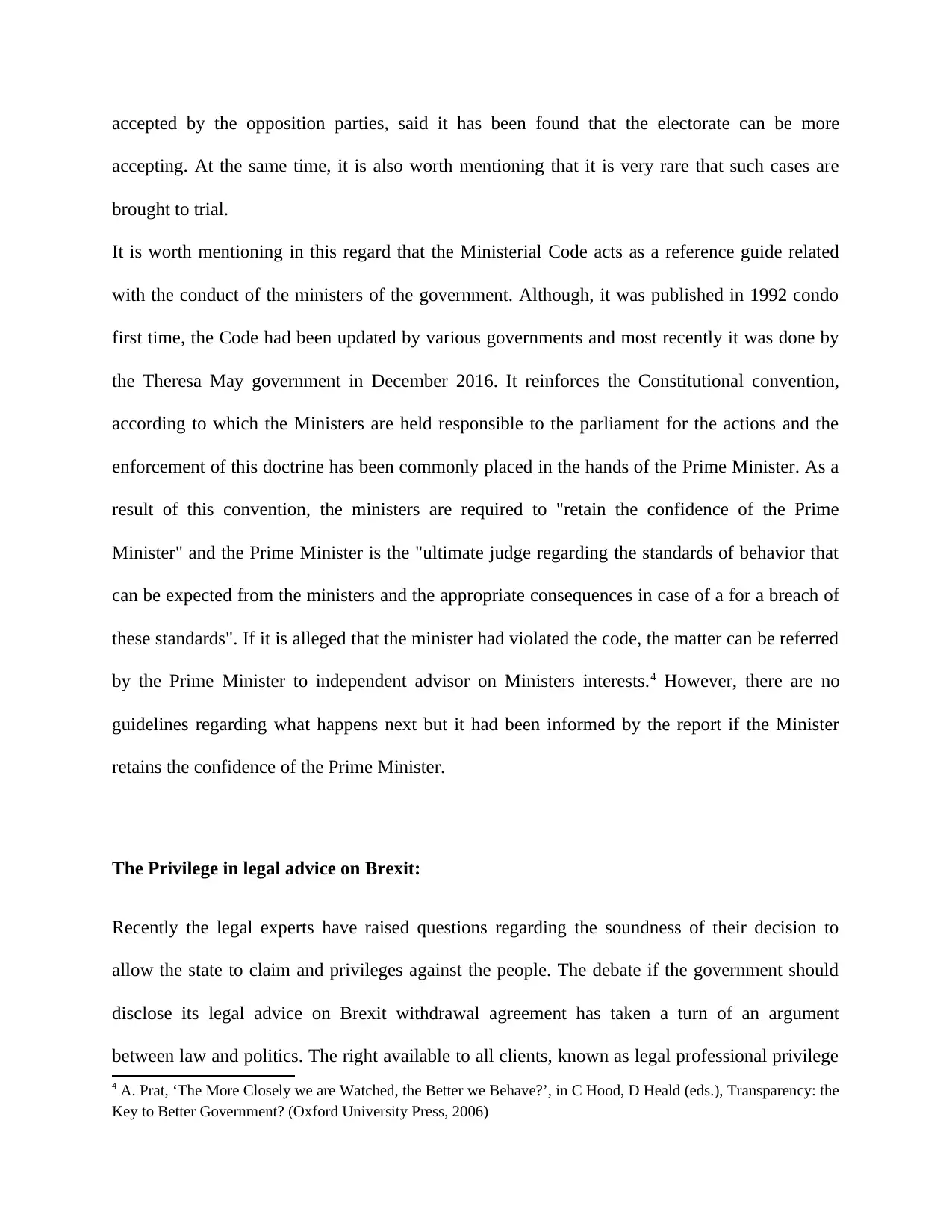
accepted by the opposition parties, said it has been found that the electorate can be more
accepting. At the same time, it is also worth mentioning that it is very rare that such cases are
brought to trial.
It is worth mentioning in this regard that the Ministerial Code acts as a reference guide related
with the conduct of the ministers of the government. Although, it was published in 1992 condo
first time, the Code had been updated by various governments and most recently it was done by
the Theresa May government in December 2016. It reinforces the Constitutional convention,
according to which the Ministers are held responsible to the parliament for the actions and the
enforcement of this doctrine has been commonly placed in the hands of the Prime Minister. As a
result of this convention, the ministers are required to "retain the confidence of the Prime
Minister" and the Prime Minister is the "ultimate judge regarding the standards of behavior that
can be expected from the ministers and the appropriate consequences in case of a for a breach of
these standards". If it is alleged that the minister had violated the code, the matter can be referred
by the Prime Minister to independent advisor on Ministers interests.4 However, there are no
guidelines regarding what happens next but it had been informed by the report if the Minister
retains the confidence of the Prime Minister.
The Privilege in legal advice on Brexit:
Recently the legal experts have raised questions regarding the soundness of their decision to
allow the state to claim and privileges against the people. The debate if the government should
disclose its legal advice on Brexit withdrawal agreement has taken a turn of an argument
between law and politics. The right available to all clients, known as legal professional privilege
4 A. Prat, ‘The More Closely we are Watched, the Better we Behave?’, in C Hood, D Heald (eds.), Transparency: the
Key to Better Government? (Oxford University Press, 2006)
accepting. At the same time, it is also worth mentioning that it is very rare that such cases are
brought to trial.
It is worth mentioning in this regard that the Ministerial Code acts as a reference guide related
with the conduct of the ministers of the government. Although, it was published in 1992 condo
first time, the Code had been updated by various governments and most recently it was done by
the Theresa May government in December 2016. It reinforces the Constitutional convention,
according to which the Ministers are held responsible to the parliament for the actions and the
enforcement of this doctrine has been commonly placed in the hands of the Prime Minister. As a
result of this convention, the ministers are required to "retain the confidence of the Prime
Minister" and the Prime Minister is the "ultimate judge regarding the standards of behavior that
can be expected from the ministers and the appropriate consequences in case of a for a breach of
these standards". If it is alleged that the minister had violated the code, the matter can be referred
by the Prime Minister to independent advisor on Ministers interests.4 However, there are no
guidelines regarding what happens next but it had been informed by the report if the Minister
retains the confidence of the Prime Minister.
The Privilege in legal advice on Brexit:
Recently the legal experts have raised questions regarding the soundness of their decision to
allow the state to claim and privileges against the people. The debate if the government should
disclose its legal advice on Brexit withdrawal agreement has taken a turn of an argument
between law and politics. The right available to all clients, known as legal professional privilege
4 A. Prat, ‘The More Closely we are Watched, the Better we Behave?’, in C Hood, D Heald (eds.), Transparency: the
Key to Better Government? (Oxford University Press, 2006)
⊘ This is a preview!⊘
Do you want full access?
Subscribe today to unlock all pages.

Trusted by 1+ million students worldwide
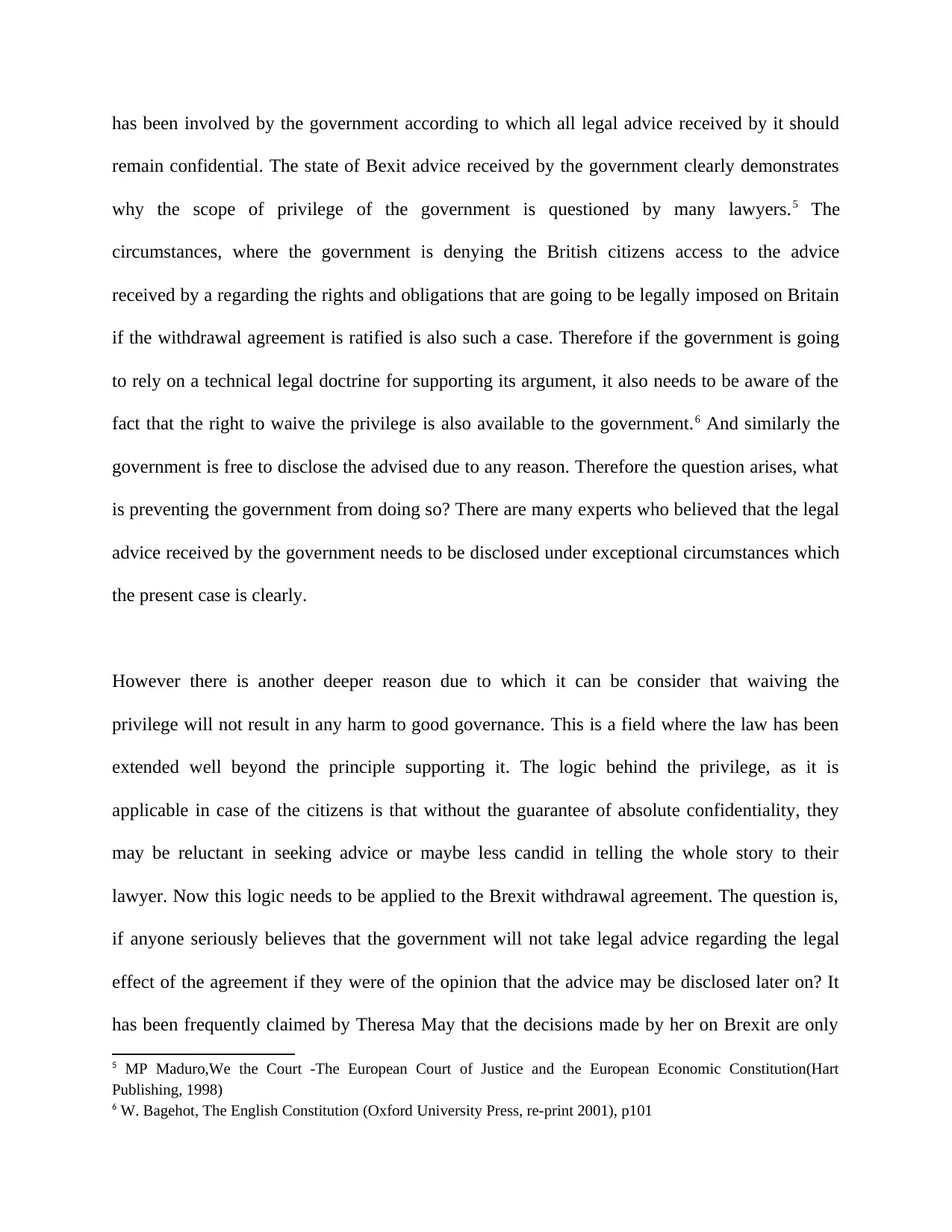
has been involved by the government according to which all legal advice received by it should
remain confidential. The state of Bexit advice received by the government clearly demonstrates
why the scope of privilege of the government is questioned by many lawyers.5 The
circumstances, where the government is denying the British citizens access to the advice
received by a regarding the rights and obligations that are going to be legally imposed on Britain
if the withdrawal agreement is ratified is also such a case. Therefore if the government is going
to rely on a technical legal doctrine for supporting its argument, it also needs to be aware of the
fact that the right to waive the privilege is also available to the government.6 And similarly the
government is free to disclose the advised due to any reason. Therefore the question arises, what
is preventing the government from doing so? There are many experts who believed that the legal
advice received by the government needs to be disclosed under exceptional circumstances which
the present case is clearly.
However there is another deeper reason due to which it can be consider that waiving the
privilege will not result in any harm to good governance. This is a field where the law has been
extended well beyond the principle supporting it. The logic behind the privilege, as it is
applicable in case of the citizens is that without the guarantee of absolute confidentiality, they
may be reluctant in seeking advice or maybe less candid in telling the whole story to their
lawyer. Now this logic needs to be applied to the Brexit withdrawal agreement. The question is,
if anyone seriously believes that the government will not take legal advice regarding the legal
effect of the agreement if they were of the opinion that the advice may be disclosed later on? It
has been frequently claimed by Theresa May that the decisions made by her on Brexit are only
5 MP Maduro,We the Court -The European Court of Justice and the European Economic Constitution(Hart
Publishing, 1998)
6 W. Bagehot, The English Constitution (Oxford University Press, re-print 2001), p101
remain confidential. The state of Bexit advice received by the government clearly demonstrates
why the scope of privilege of the government is questioned by many lawyers.5 The
circumstances, where the government is denying the British citizens access to the advice
received by a regarding the rights and obligations that are going to be legally imposed on Britain
if the withdrawal agreement is ratified is also such a case. Therefore if the government is going
to rely on a technical legal doctrine for supporting its argument, it also needs to be aware of the
fact that the right to waive the privilege is also available to the government.6 And similarly the
government is free to disclose the advised due to any reason. Therefore the question arises, what
is preventing the government from doing so? There are many experts who believed that the legal
advice received by the government needs to be disclosed under exceptional circumstances which
the present case is clearly.
However there is another deeper reason due to which it can be consider that waiving the
privilege will not result in any harm to good governance. This is a field where the law has been
extended well beyond the principle supporting it. The logic behind the privilege, as it is
applicable in case of the citizens is that without the guarantee of absolute confidentiality, they
may be reluctant in seeking advice or maybe less candid in telling the whole story to their
lawyer. Now this logic needs to be applied to the Brexit withdrawal agreement. The question is,
if anyone seriously believes that the government will not take legal advice regarding the legal
effect of the agreement if they were of the opinion that the advice may be disclosed later on? It
has been frequently claimed by Theresa May that the decisions made by her on Brexit are only
5 MP Maduro,We the Court -The European Court of Justice and the European Economic Constitution(Hart
Publishing, 1998)
6 W. Bagehot, The English Constitution (Oxford University Press, re-print 2001), p101
Paraphrase This Document
Need a fresh take? Get an instant paraphrase of this document with our AI Paraphraser
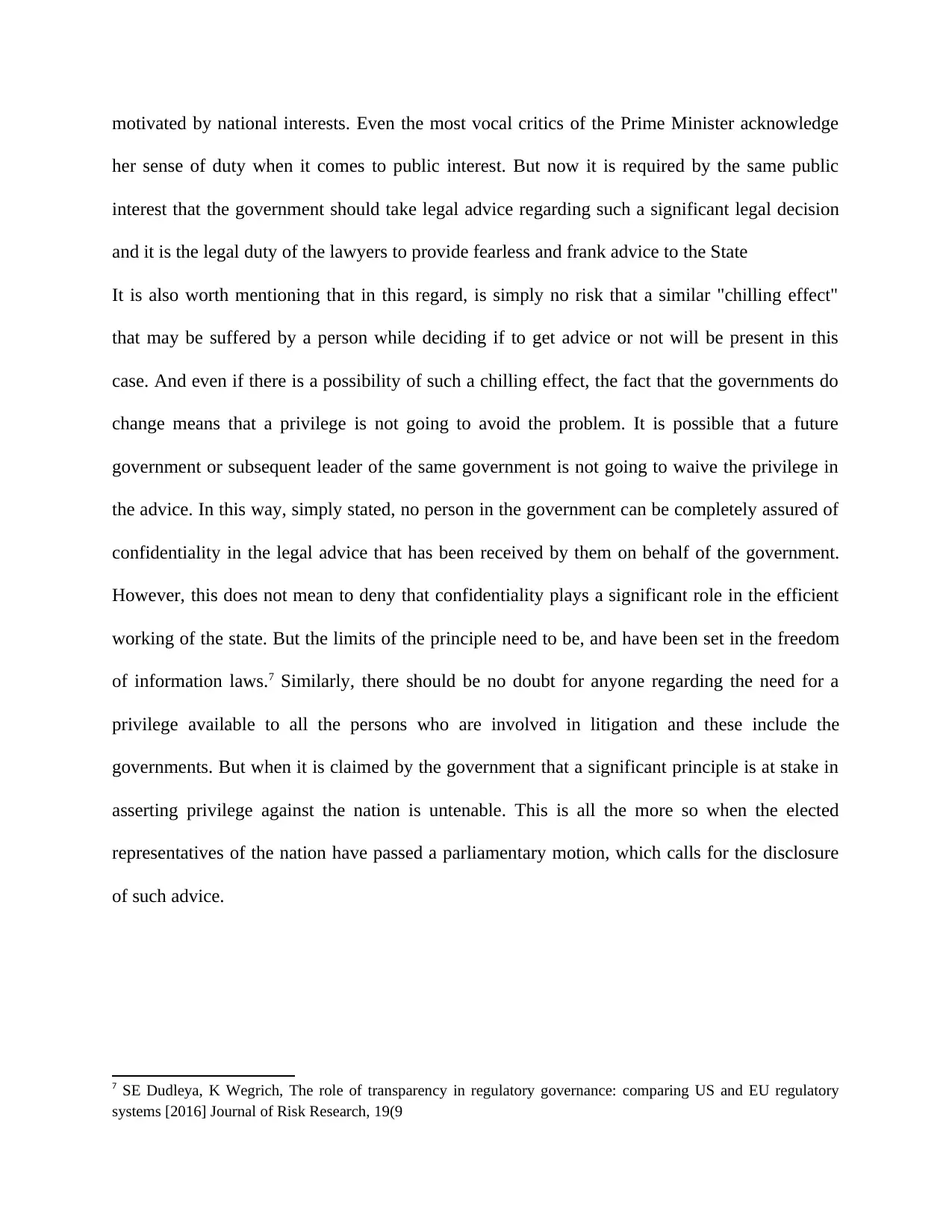
motivated by national interests. Even the most vocal critics of the Prime Minister acknowledge
her sense of duty when it comes to public interest. But now it is required by the same public
interest that the government should take legal advice regarding such a significant legal decision
and it is the legal duty of the lawyers to provide fearless and frank advice to the State
It is also worth mentioning that in this regard, is simply no risk that a similar "chilling effect"
that may be suffered by a person while deciding if to get advice or not will be present in this
case. And even if there is a possibility of such a chilling effect, the fact that the governments do
change means that a privilege is not going to avoid the problem. It is possible that a future
government or subsequent leader of the same government is not going to waive the privilege in
the advice. In this way, simply stated, no person in the government can be completely assured of
confidentiality in the legal advice that has been received by them on behalf of the government.
However, this does not mean to deny that confidentiality plays a significant role in the efficient
working of the state. But the limits of the principle need to be, and have been set in the freedom
of information laws.7 Similarly, there should be no doubt for anyone regarding the need for a
privilege available to all the persons who are involved in litigation and these include the
governments. But when it is claimed by the government that a significant principle is at stake in
asserting privilege against the nation is untenable. This is all the more so when the elected
representatives of the nation have passed a parliamentary motion, which calls for the disclosure
of such advice.
7 SE Dudleya, K Wegrich, The role of transparency in regulatory governance: comparing US and EU regulatory
systems [2016] Journal of Risk Research, 19(9
her sense of duty when it comes to public interest. But now it is required by the same public
interest that the government should take legal advice regarding such a significant legal decision
and it is the legal duty of the lawyers to provide fearless and frank advice to the State
It is also worth mentioning that in this regard, is simply no risk that a similar "chilling effect"
that may be suffered by a person while deciding if to get advice or not will be present in this
case. And even if there is a possibility of such a chilling effect, the fact that the governments do
change means that a privilege is not going to avoid the problem. It is possible that a future
government or subsequent leader of the same government is not going to waive the privilege in
the advice. In this way, simply stated, no person in the government can be completely assured of
confidentiality in the legal advice that has been received by them on behalf of the government.
However, this does not mean to deny that confidentiality plays a significant role in the efficient
working of the state. But the limits of the principle need to be, and have been set in the freedom
of information laws.7 Similarly, there should be no doubt for anyone regarding the need for a
privilege available to all the persons who are involved in litigation and these include the
governments. But when it is claimed by the government that a significant principle is at stake in
asserting privilege against the nation is untenable. This is all the more so when the elected
representatives of the nation have passed a parliamentary motion, which calls for the disclosure
of such advice.
7 SE Dudleya, K Wegrich, The role of transparency in regulatory governance: comparing US and EU regulatory
systems [2016] Journal of Risk Research, 19(9
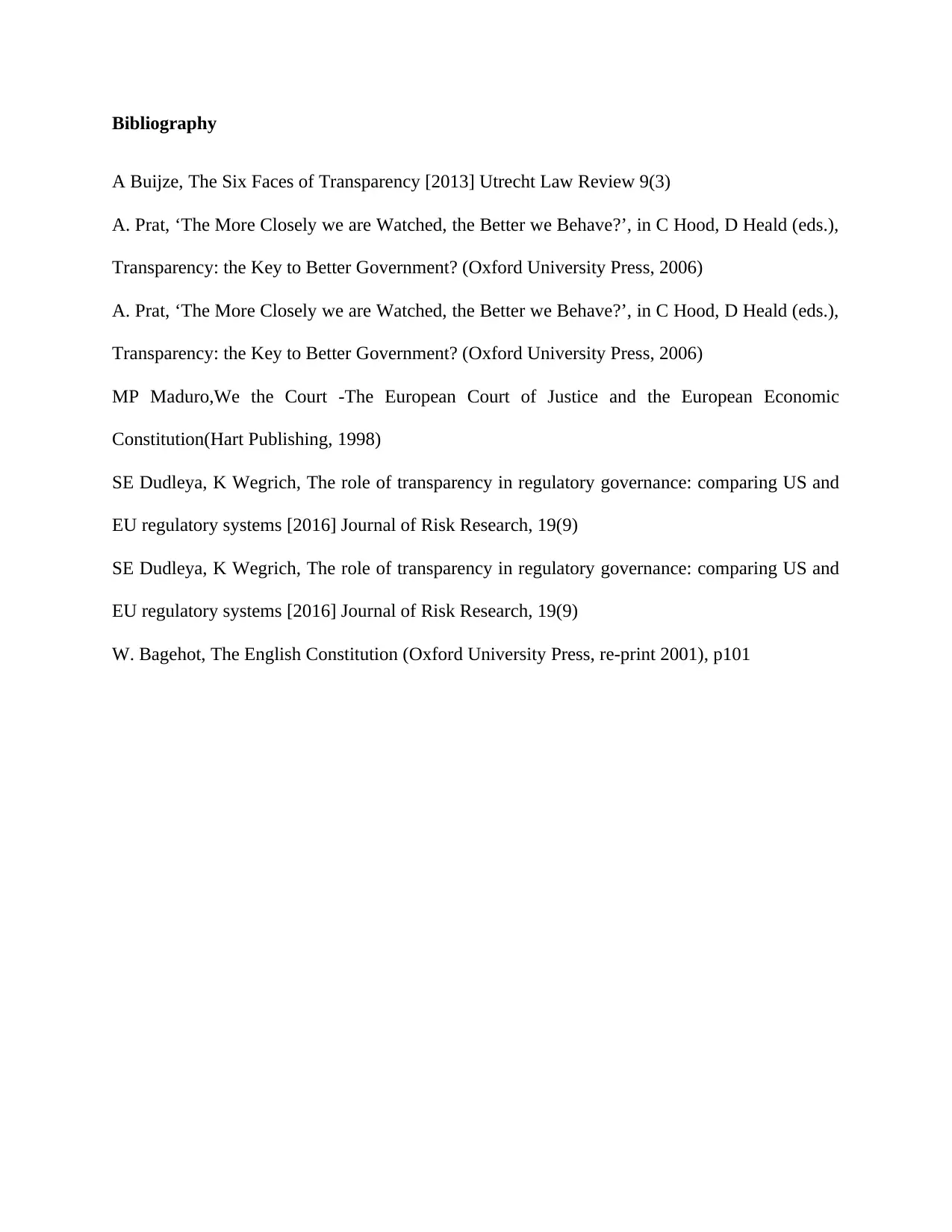
Bibliography
A Buijze, The Six Faces of Transparency [2013] Utrecht Law Review 9(3)
A. Prat, ‘The More Closely we are Watched, the Better we Behave?’, in C Hood, D Heald (eds.),
Transparency: the Key to Better Government? (Oxford University Press, 2006)
A. Prat, ‘The More Closely we are Watched, the Better we Behave?’, in C Hood, D Heald (eds.),
Transparency: the Key to Better Government? (Oxford University Press, 2006)
MP Maduro,We the Court -The European Court of Justice and the European Economic
Constitution(Hart Publishing, 1998)
SE Dudleya, K Wegrich, The role of transparency in regulatory governance: comparing US and
EU regulatory systems [2016] Journal of Risk Research, 19(9)
SE Dudleya, K Wegrich, The role of transparency in regulatory governance: comparing US and
EU regulatory systems [2016] Journal of Risk Research, 19(9)
W. Bagehot, The English Constitution (Oxford University Press, re-print 2001), p101
A Buijze, The Six Faces of Transparency [2013] Utrecht Law Review 9(3)
A. Prat, ‘The More Closely we are Watched, the Better we Behave?’, in C Hood, D Heald (eds.),
Transparency: the Key to Better Government? (Oxford University Press, 2006)
A. Prat, ‘The More Closely we are Watched, the Better we Behave?’, in C Hood, D Heald (eds.),
Transparency: the Key to Better Government? (Oxford University Press, 2006)
MP Maduro,We the Court -The European Court of Justice and the European Economic
Constitution(Hart Publishing, 1998)
SE Dudleya, K Wegrich, The role of transparency in regulatory governance: comparing US and
EU regulatory systems [2016] Journal of Risk Research, 19(9)
SE Dudleya, K Wegrich, The role of transparency in regulatory governance: comparing US and
EU regulatory systems [2016] Journal of Risk Research, 19(9)
W. Bagehot, The English Constitution (Oxford University Press, re-print 2001), p101
⊘ This is a preview!⊘
Do you want full access?
Subscribe today to unlock all pages.

Trusted by 1+ million students worldwide
1 out of 6
Your All-in-One AI-Powered Toolkit for Academic Success.
+13062052269
info@desklib.com
Available 24*7 on WhatsApp / Email
![[object Object]](/_next/static/media/star-bottom.7253800d.svg)
Unlock your academic potential
Copyright © 2020–2026 A2Z Services. All Rights Reserved. Developed and managed by ZUCOL.

